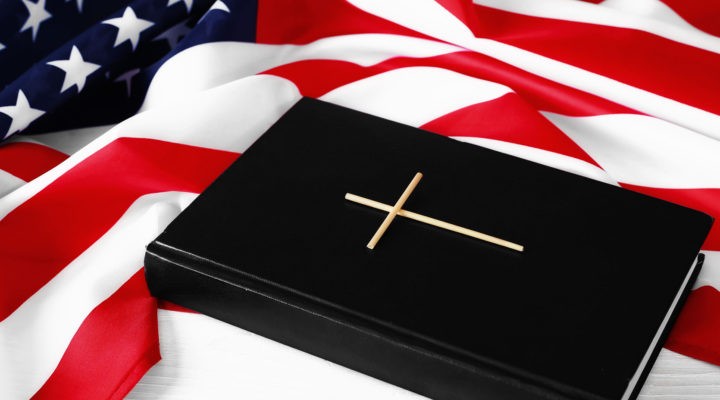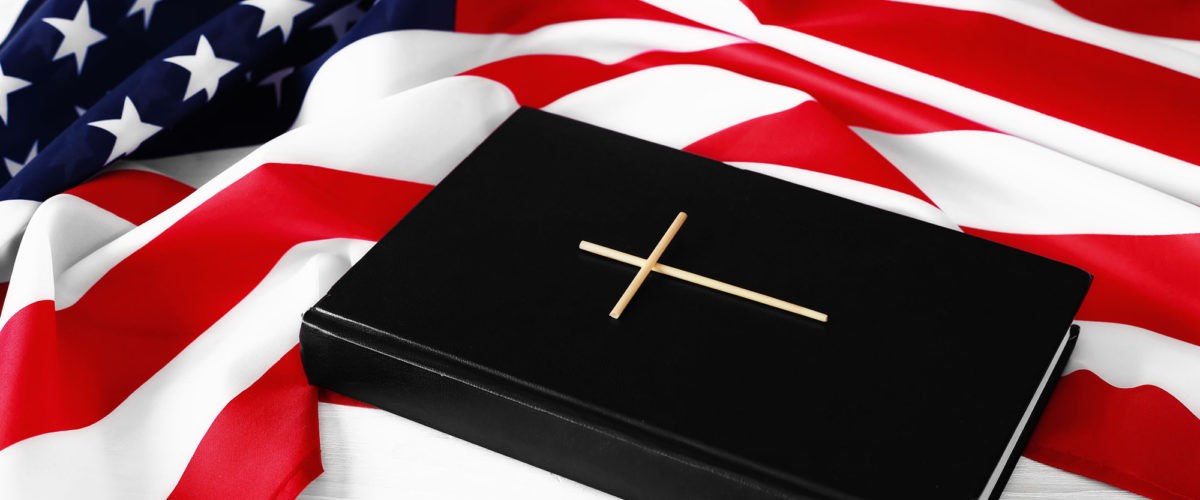New research shows white evangelical Protestants and Republicans are increasingly embracing the ideology of Christian nationalism at much higher rates than the general U.S. population.
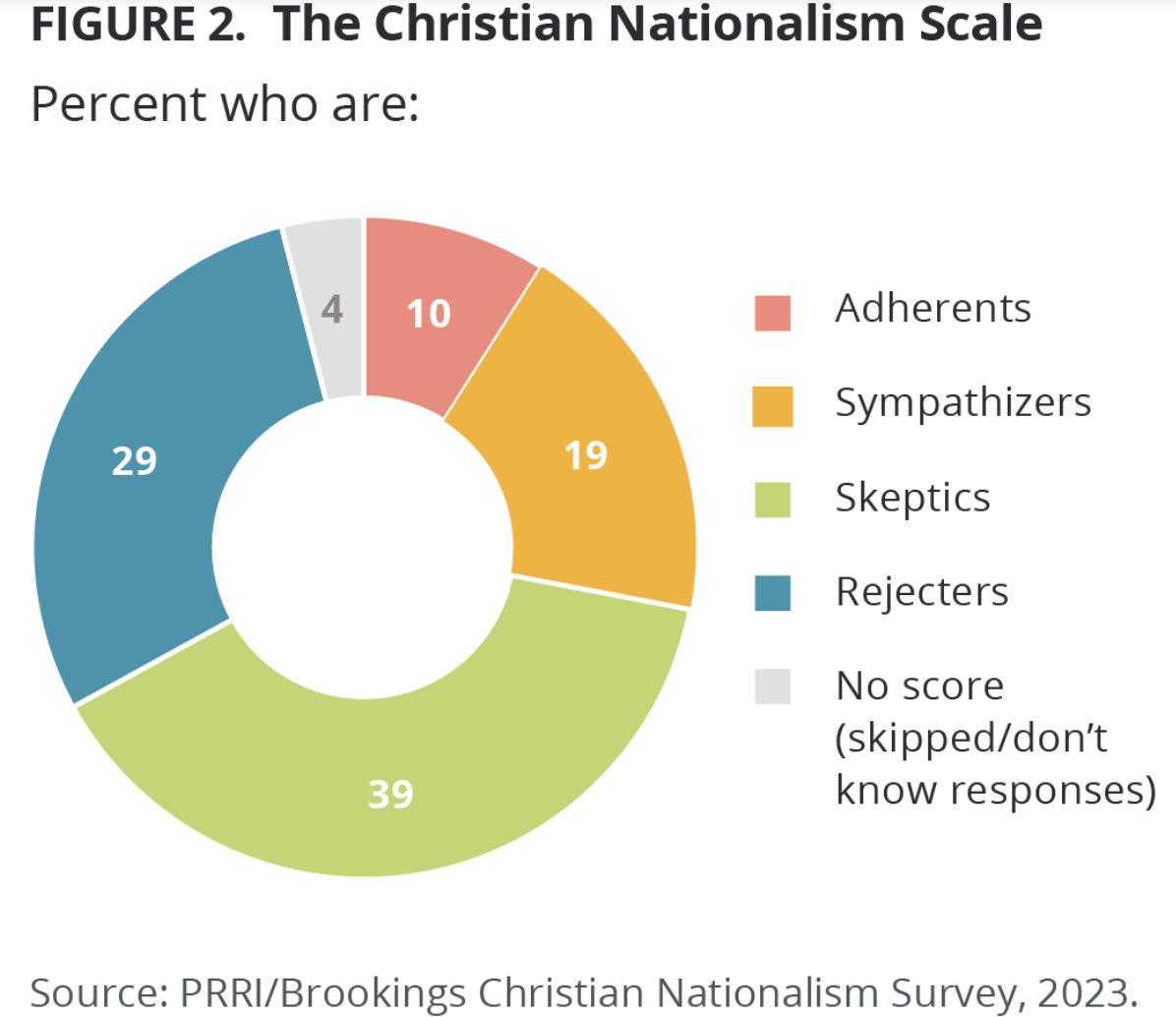 The survey of more than 6,000 Americans by Public Religion Research Institute and Brookings Institution found 29% of white evangelicals qualify as adherents of Christian nationalism and 35% are classified as sympathizers. The study released Feb. 8 also reported 21% of Republicans scored as adherents and 33% as sympathizers.
The survey of more than 6,000 Americans by Public Religion Research Institute and Brookings Institution found 29% of white evangelicals qualify as adherents of Christian nationalism and 35% are classified as sympathizers. The study released Feb. 8 also reported 21% of Republicans scored as adherents and 33% as sympathizers.
In contrast, only 10% of all Americans are considered adherents of Christian nationalism and 19% are considered sympathizers of the ideology.
That means white evangelicals are three times more likely than the general population to qualify as adherents of Christian nationalism and twice as likely to be classified as sympathizers.
“Christian nationalism is a new term for a worldview that has been with us since the founding of our country — the idea that America is destined to be a promised land for European Christians,” PRRI founder and President Robert P. Jones said in a news release. “While most Americans today embrace pluralism and reject this anti-democratic claim, majorities of white evangelical Protestants and Republicans remain animated by this vision of a white Christian America.”
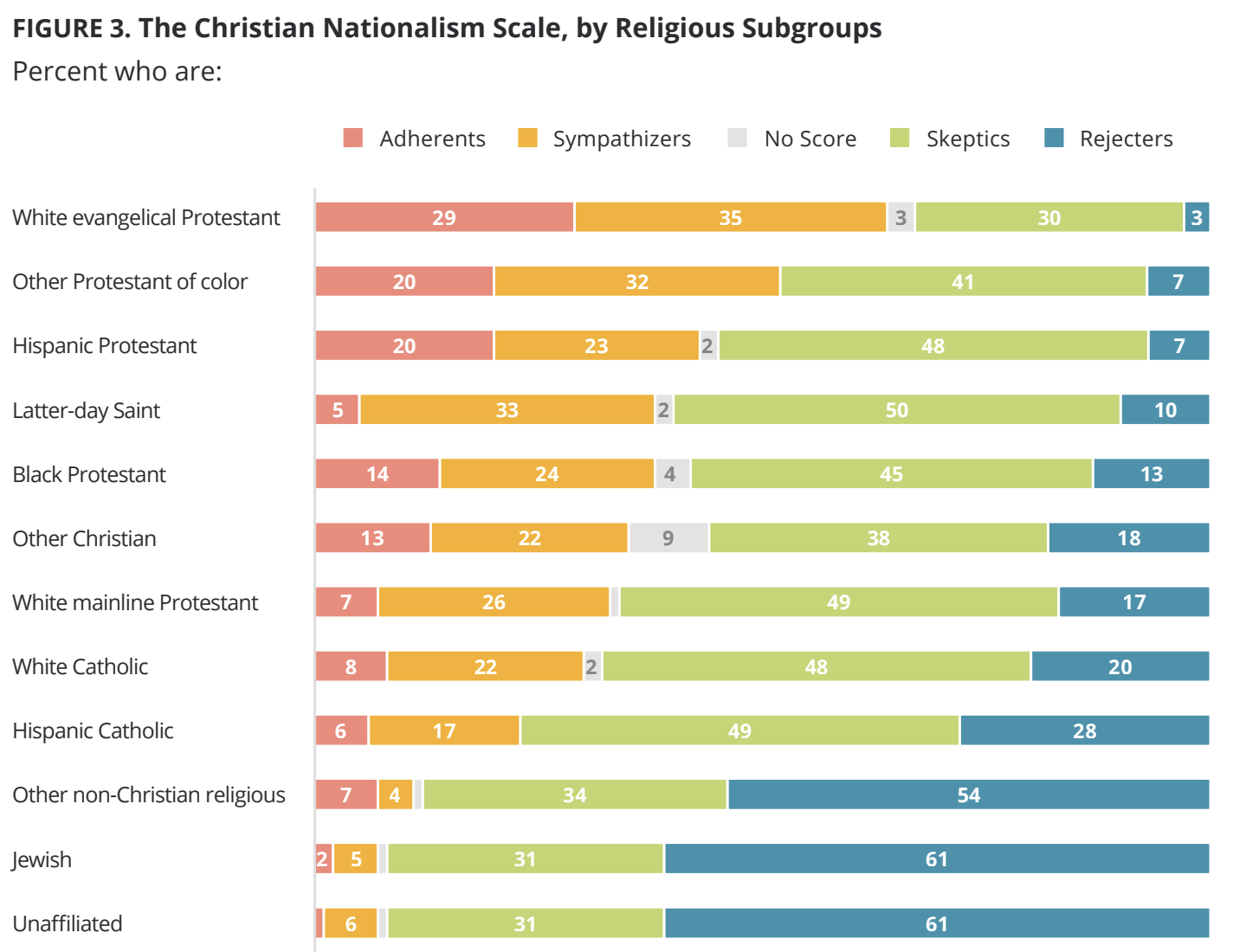
PRRI and Brookings teased out those attitudes by asking survey respondents to express their level of agreement or disagreement with five statements concerning the relationship between the U.S. government, society and Christianity.
Those statements are:
- “The U.S. government should declare America a Christian nation.”
- “U.S. laws should be based on Christian values.”
- “If the U.S. moves away from our Christian foundations, we will not have a country anymore.”
- “Being Christian is an important part of being truly American.”
- God has called Christians to exercise dominion over all areas of American society.”
A person’s overall response to these five questions determined their classification as an adherent or sympathizer of Christian nationalism.
Looking at two of the questions individually, respondents said:
- When asked to respond to the idea that the federal government should declare the U.S. a Christian nation, 50% of all Americans completely disagree and another 20% mostly disagree. Only 10% completely agree. Among those inclined toward Christian nationalism, however, 75% completely agree with the statement, compared to 11% of sympathizers. All rejecters of the ideology completely disagreed.
- Less than half of Americans (46%) completely agree that being Christian is an important part of being truly American. By contrast, 77% of Christian nationalism adherents completely agree.
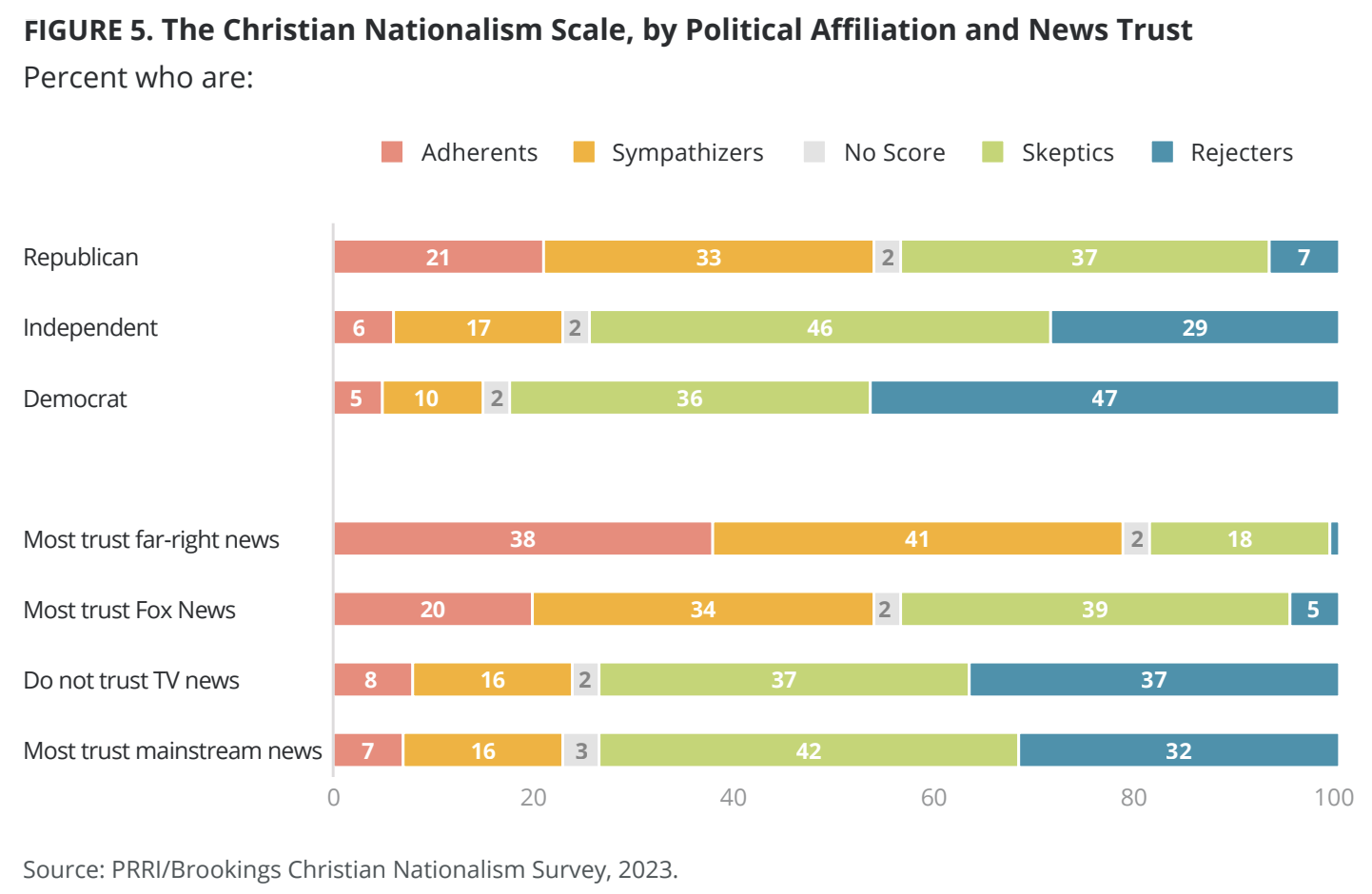
The survey demonstrates a significant connection between religious affiliation and responses to the five statements.
“A majority of ‘other Protestants of color,’ a group consisting primarily of Asian American and Pacific Islander and mixed-race Protestants, also qualify as either sympathizers (32%) or adherents (20%). Approximately four in 10 Hispanic Protestants (23% sympathizers and 20% adherents), Black Protestants (24% sympathizers and 14% adherents), and Latter-day Saints (33% sympathizers and 5% adherents) also lean toward supporting Christian nationalism,” PRRI and Brookings reported.
“At the other end of the spectrum, more than three-quarters of Hispanic Catholics, other non-Christian religious Americans, Jews and religiously unaffiliated Americans qualify as either Christian nationalism skeptics or rejecters. Notably, majorities of other non-Christian religious Americans (54%), Jewish Americans (61%), and religiously unaffiliated Americans (61%) qualify as rejecters.”
Identifying as evangelical, however, is a significant predictor of attitudes favorable to Christian nationalism beliefs.
Identifying as evangelical, however, is a significant predictor of attitudes favorable to Christian nationalism beliefs, the survey found.
“White (29%), Hispanic (25%), and Black (20%) Christians who identify as born-again or evangelical are each about five times as likely to be Christian nationalism adherents as members of the same racial or ethnic groups who identify as Christian but not evangelical (6% of white non-evangelicals, 4% of Black non-evangelicals, and 4% of Hispanic non-evangelicals).”
PRRI and Brookings also noticed those most inclined toward Christian nationalism are more likely than other Americans to be dedicated attenders of religious services: “Christian nationalism adherents are nearly twice as likely as Americans overall to report attending religious services at least a few times a month (54% vs. 28%).”
The study also found the inverse to be true. “As support for Christian nationalism goes down, so do reported church attendance rates: 42% of Christian nationalism sympathizers report attending church at least a few times a month, compared with 27% of skeptics, and only 10% of rejecters. Similarly, 44% of Christian nationalism adherents report that religion is the most important thing in their lives, compared to 24% of sympathizers, 10% of skeptics, and 3% of rejecters.”
The connection between political affiliation and attraction to Christian nationalist values also is documented in the study, most notably with 54% of Republicans scoring as either adherents or sympathizers of the ideology. Only 15% of Democrats and 23% of independents fall in that category.
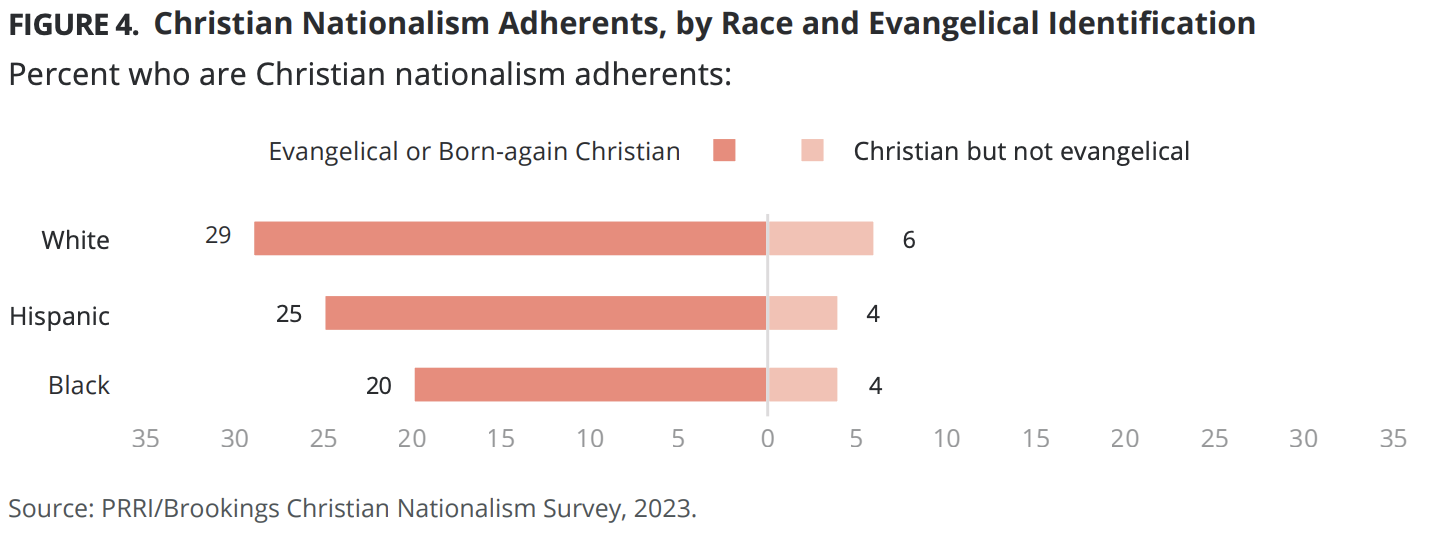
The study also captures a connection between attitudes toward President Joe Biden and former President Donald Trump and the embrace or rejection of Christian nationalism.
“Just one-third of Americans (32%) hold a favorable view of former President Trump, while two-thirds (65%) have unfavorable views of him,” the report states. “More than seven in 10 Christian nationalism adherents (71%) have a favorable view of Trump, including 43% who hold very favorable views of him. A majority of Christian nationalism sympathizers also hold favorable views of Trump (57%), compared to 29% of skeptics, and 8% of rejecters.”
Related articles:
The threat of Christian nationalism has only grown since January 6 | Opinion by Brandan Robertson
The New Apostolic Reformation drove the January 6 riots, so why was it overlooked by the House Select Committee? | Analysis by Rick Pidcock
BJC offers free downloadable report explaining January 6 in light of Christian nationalism
Five takeaways from the Report on Christian Nationalism and January 6 | Opinion by Corey Fields

